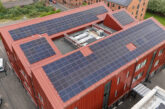
Rooftop solar is growing rapidly year-on-year as homeowners look for ways to protect themselves against the rising cost of living. Griff Thomas, from GTEC, explores the business potential of this trend for those with electrical skills.
Last year, there were nearly 67,000 domestic solar photovoltaics (PV) and solar thermal installations – far more than heat pumps and an increase of 36% compared to the previous year.
After nearly a decade of subsidies during the Feed-in-Tariff years, solar PV has seen significant technological developments and a reduction in capital costs, enabling it to become financially viable for the first time.
So, let’s take a look at what is fuelling the uptake of solar PV:
Rising energy costs
We’ve just seen the price cap rise by a whopping 54% and there is very little certainty about prices as we head into the winter. Faced with such a tangible increase in basic living costs, many homeowners will be looking for ways to increase their energy efficiency and bring down bills.
Reduction in upfront costs
The recent decision to simplify the VAT process for solar PV and other energy saving technologies – including domestic batteries – will help to push the low carbon sector forward, streamlining sales and making renewable solutions more accessible by reducing upfront costs, something that has been a major barrier in the past.
Part L uplift
Changes to Part L of the Building Regulations this month will require new builds to reduce carbon emissions by 31%. Improvements to the building fabric will only go so far and if gas heating is retained, solar PV will also be required to meet new standards. Solar Energy UK predicts that solar PV could feature on almost all new build homes under the new regulations.
The business opportunity
The UK needs suitably trained, qualified and Microgeneration Certification Scheme (MCS) accredited installers to meet demand for alternative heating systems as consumer interest grows and energy efficiency standards develop.
Solar PV and associated technologies, including electrical energy storage systems (EESS) and EV charging equipment, are an upskill for practicing electricians, electrical technicians and engineers – anyone with experience of electrical installations, and associated inspection and testing who is looking to expand their service offering and take advantage of increasing demand for domestic renewables. Training is relatively quick because it is designed to build on existing qualifications, so you won’t be starting from scratch.
Battery storage is seen as one of the key technologies that will support the roll-out of renewables, both domestically and at grid level. In domestic settings, they increase the ‘self-consumption’ of buildings fitted with solar PV systems, so a qualification in the design, installation and commissioning of EESS sits nicely alongside solar PV capabilities.
Renewables are the future
Renewable energy benefits everyone – by providing a cheap alternative to fossil fuels, it helps to bring down the cost of wholesale energy. The more households that generate, store and use their own electricity the better – for consumers’ pockets, installation businesses and for the challenge of decarbonising this hard-to-abate sector.
GTEC delivers specialist renewables training from its centre in Hawes, North Yorkshire, as well as others locations throughout the UK.
To browse GTEC’s range of training courses, click here










